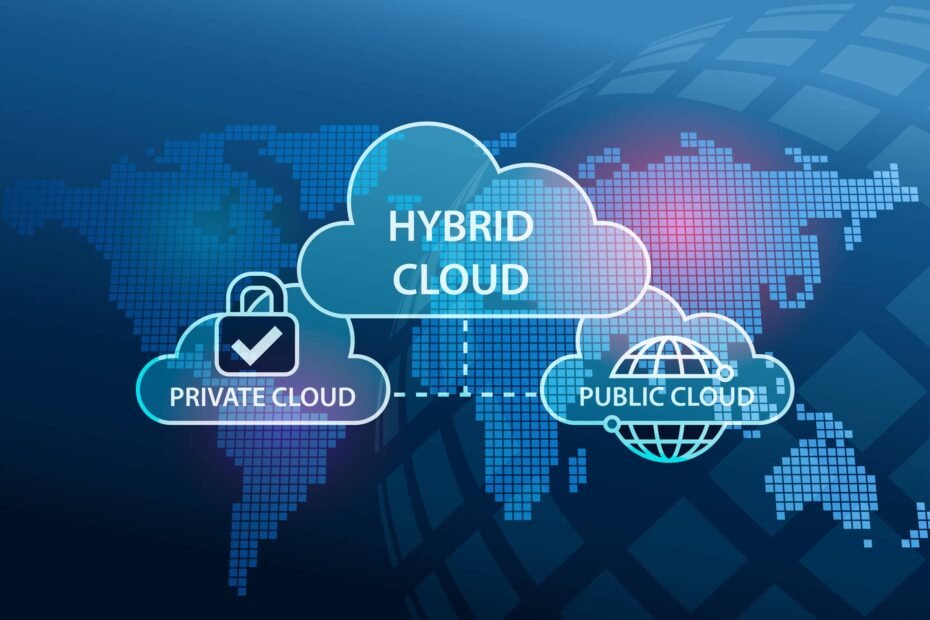Exploring the Basics of Hybrid Cloud: What is Hybrid Cloud and its Benefits?
The notion of cloud computing has been in existence for a while. Yet, integrating hybrid cloud arrangements has unlocked a new realm of prospects for firms and organizations. A hybrid cloud amalgamates public cloud amenities and exclusive servers, enabling establishments to exploit the scalability and cost-effectiveness coupled with the public cloud while also having the security and command presented by a private server. In this article, we will study what is hybrid cloud, its definition, its advantages, and how it can assist organizations in attaining their objectives.
What is Hybrid Cloud?
A hybrid cloud fuses public clouds and exclusive servers, permitting associations to benefit from the adaptability and cost-saving points of interest connected with public clouds while having the security and oversight offered by a private server. Like this, it is an ideal answer for organizations dealing with vast measures of information or applications across various situations. Moreover, hybrid clouds are not restricted to just one sort of cloud supplier; they very well may be utilized with any blend of public or private suppliers. This flexibility makes them great for businesses that manage multiple workloads or applications in different environments.
Hybrid clouds can also benefit organizations using the latest technologies, such as artificial intelligence (AI) and machine learning (ML). For example, organizations can quickly deploy AI and ML applications without investing in additional hardware or software by combining public clouds’ power with private servers’ control. Additionally, hybrid clouds allow organizations to quickly deploy new applications or services to stay ahead of the competition.
Finally, hybrid clouds are becoming increasingly popular because they help organizations meet compliance requirements. By storing data on public and private servers, organizations can ensure they meet all regulatory requirements while taking advantage of a hybrid cloud solution’s scalability and cost savings.
Overall, hybrid cloud solutions offer numerous benefits for businesses looking for additional scalability, cost savings, security, control, and flexibility. In addition, hybrid clouds are an ideal solution for any organization looking to stay ahead of the competition while ensuring their data remains secure.
Benefits of Hybrid Cloud
Hybrid clouds have many advantages, including scalability, cost savings, security, and control. By combining public clouds with private servers, organizations can scale up quickly when needed without investing in additional hardware or software. This economizes pecuniary outlay in expenditure and duration since there is no requirement to acquire or instate new apparatus or program when more capacity is required. Also, hybrid clouds supply augmented safety since information is retained on public and confidential servers, making it more intricate for crackers to gain admittance. Lastly, organizations have greater control over their data since they own the public and private servers that comprise the hybrid cloud system.
Using Hybrid Clouds Effectively
To optimize the potential of hybrid cloud technology, a company must comprehend its mechanics and determine the most advantageous way to integrate it into its system. The first step is determining which workloads best suit a hybrid cloud solution. Uncommon workloads amenable to hybrid clouds encompass web programs, mobile programs, data analytics instruments, databases, file storage systems, DevOps tools like containers or Kubernetes clusters, and any other application necessitating access from multiple locales or situations. Additionally, organizations must determine which type of provider they should use – whether it’s a public provider to ensure that their data remains secure while taking advantage of the scalability offered by a hybrid cloud solution.
Conclusion
Hybrid clouds offer numerous benefits for businesses looking for additional scalability and cost savings while maintaining control over their data. Companies can effectively use this technology without compromising on security or control over their data by understanding what workloads are best suited for hybrid clouds and which providers are best suited for their particular needs. With its ability to scale quickly while maintaining control over costs and data security, hybrid clouds are an ideal solution for any organization looking to stay ahead in today’s rapidly changing world.
